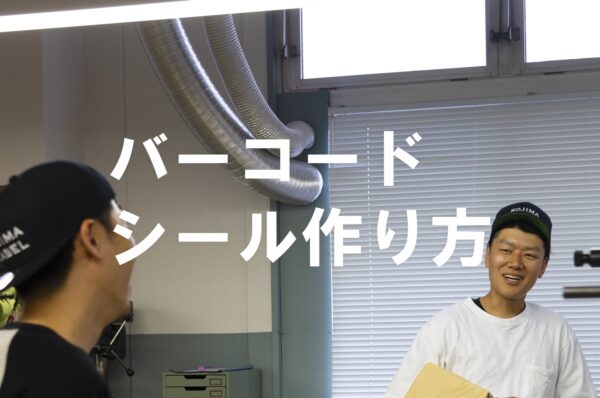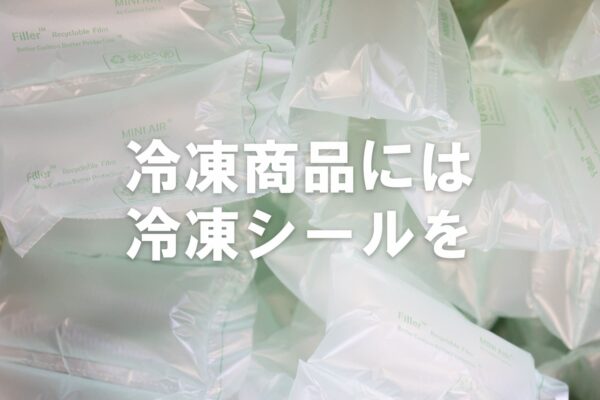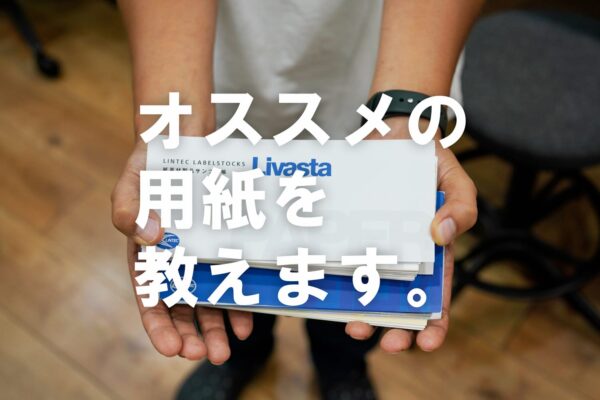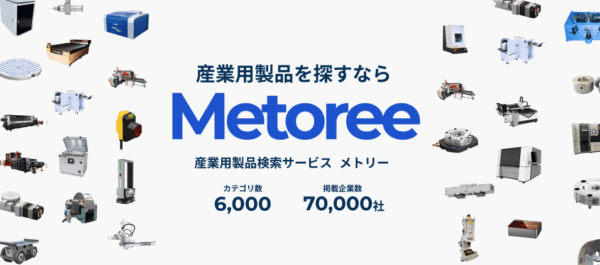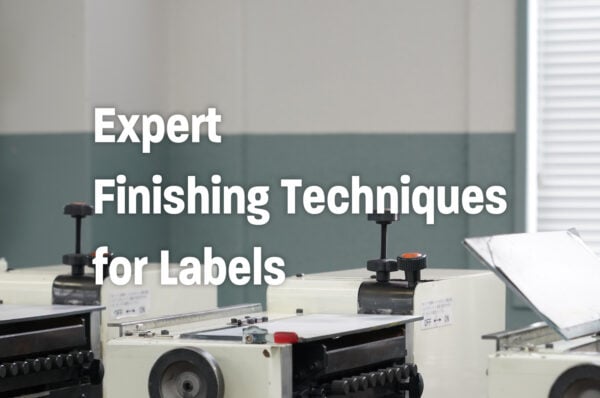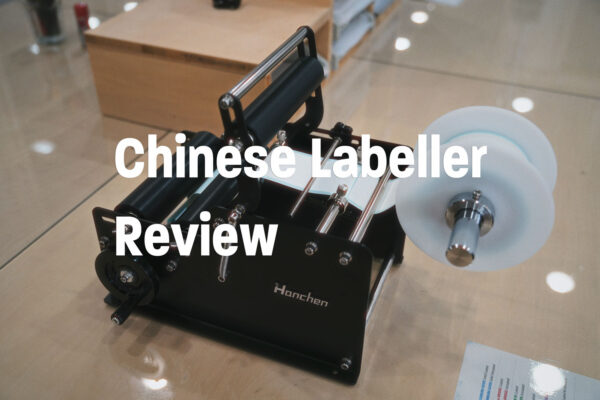What are the Characteristics of Matte Coated Paper? Differences from Coated and Glossy Paper with Case Studies
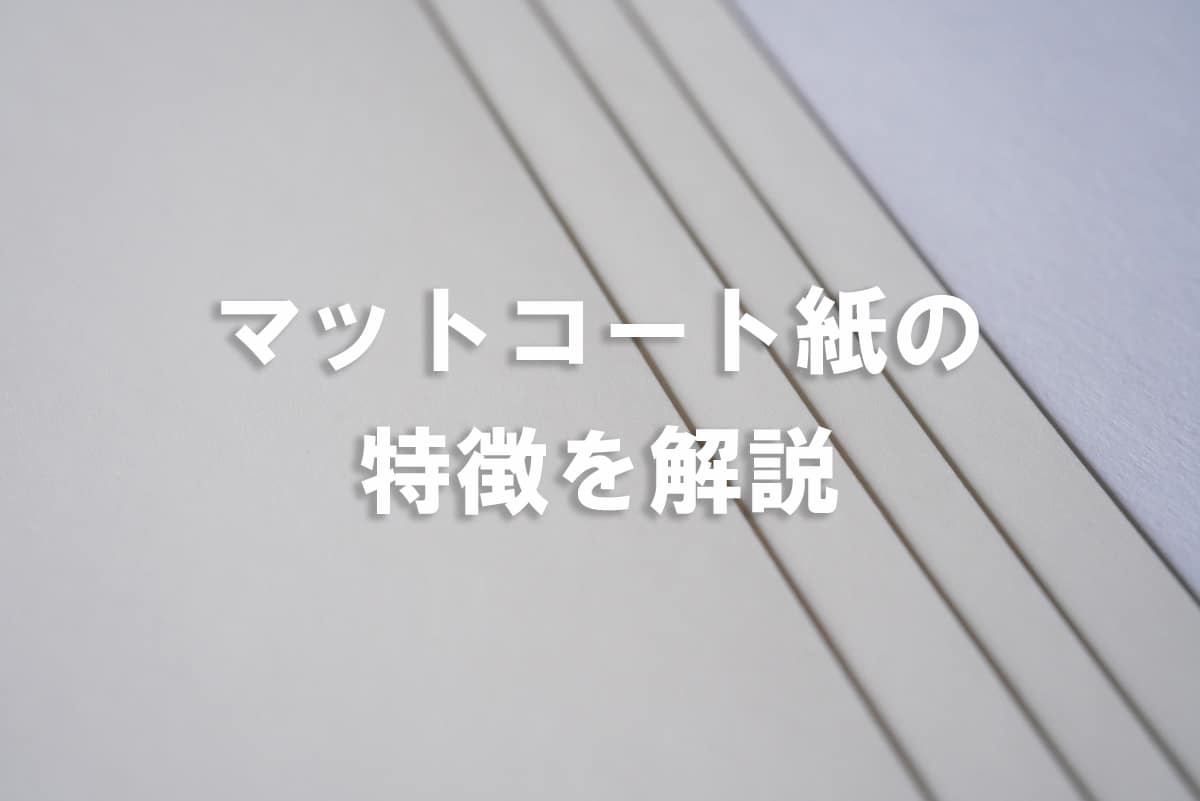
Matte coat paper is a type of paper used in various printed materials such as flyers and pamphlets. The final appearance of printed materials is greatly influenced by the choice of paper, so it is important to select the appropriate paper according to its intended use.
This article introduces the characteristics of matte coat paper, its recommended applications, the differences and selection criteria compared to other printing papers, as well as precautions during production. If you are considering using matte coat paper for your project, please use this as a reference.
Our company produces custom-made product labels using matte coat paper. We provide careful support to ensure that your product labels and seals come out exactly as you envision them, so please feel free to contact us.
For those struggling with label and sticker printing
Wondering if this kind of printing is possible? Or how much budget is needed?
If you have any concerns, feel free to reach out to us.
First, check out our case studies.
※Orders are available starting from 1,000 pieces.
※Business hours: Japan Standard Time, Monday to Friday, 9:00 AM - 5:00 PM
What Is Matte Coat Paper? An Introduction to Its Materials and Features

Matte coat paper is paper that has been treated with a matte finish. It is mainly used for printed materials and has the following characteristics:
- A smooth texture without gloss
- An elegant, subdued impression that can convey a sense of luxury
- Relatively inexpensive
Feature 1: A Smooth, Non-Glossy Texture
Matte coat paper is a paper that has a smooth texture due to the application of a coating agent on its surface. Its matte appearance minimizes shine, allowing you to enjoy the natural texture of the paper.
In addition, it is a paper that can be written on with pencils or ballpoint pens, making it suitable for applications where individual information needs to be written, such as product labels or organizational labels.
Feature 2: An Elegant, Subdued Impression That Conveys Luxury
Matte coat paper offers a natural feel unique to paper, making it ideal for enhancing design and brand image. It can create a sense of luxury and sophistication, adding value to your product.
Moreover, its non-glossy finish makes printed text and images easy to read and gentle on the eyes.
Feature 3: Relatively Inexpensive
Matte coat paper is moderately priced and offers high cost performance.
Because it is low in cost, it is suitable for large-scale printing or projects that prioritize budget, making it a recommended choice for flyers, pamphlets, and product labels.
For a complete list of paper and film materials used for labels and seals, please refer to the page below as a guide for your material selection.
Thickness and Main Applications of Matte Coat Paper
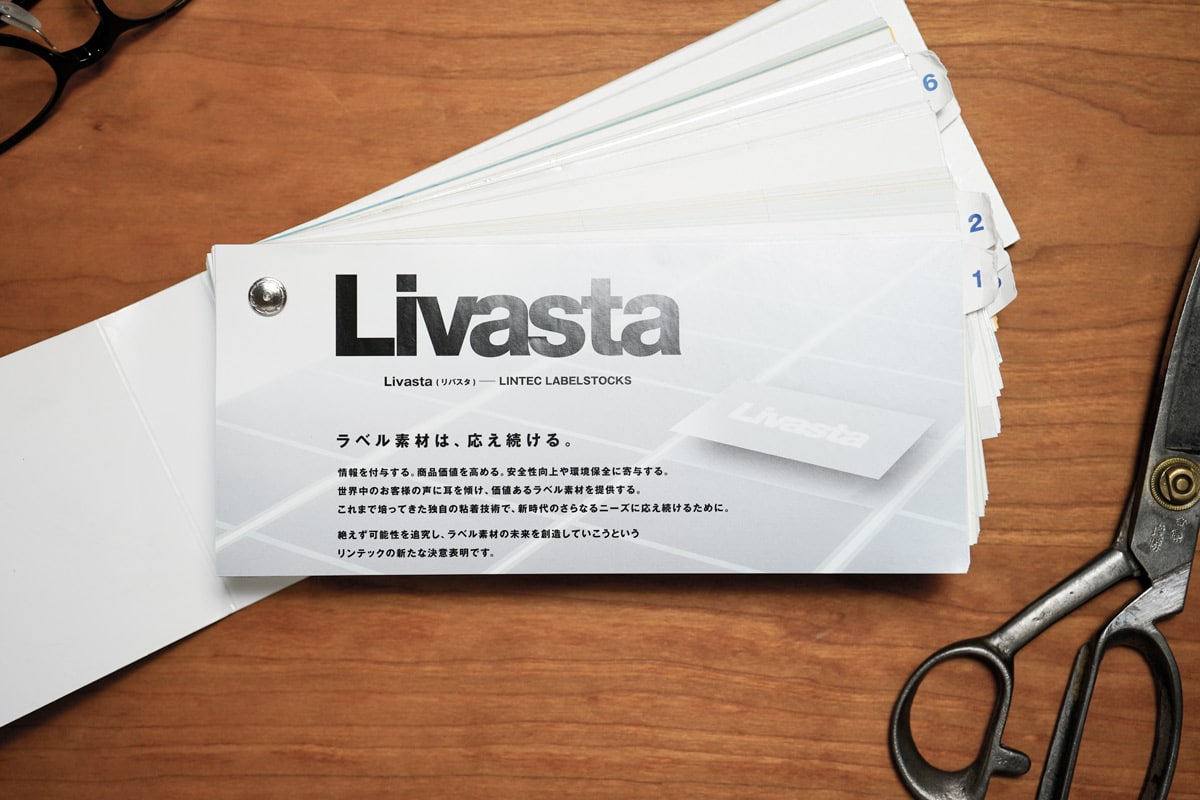
Matte coat paper is highly versatile and can be used in various applications and environments.
For example, in pamphlets, adjusting the thickness can make the paper suitable for both the main text and the cover.
There is a wide range of options from thin to thick paper, allowing you to select the optimal thickness for your needs. Below is a summary of the main thicknesses of matte coat paper and examples of their applications.
| Thickness | Example Applications |
| 73kg | Newspaper inserts, magazine interiors, etc. |
| 90kg | Flyers, brochures, leaflets, etc. |
| 110kg | Pamphlets, corporate brochures, tickets, etc. |
| 135kg | Booklet covers, posters, etc. |
In addition to flyers and pamphlets, matte coat paper is also suitable for printing seals and labels.
If you would like to learn more about matte coat paper, please refer to the article below.
Matte Coat Paper | A Paper Material Noted for Its Matte Finish and Pure White Color
Differences Between Matte Coat Paper and Other Papers
This section introduces other commonly used printing papers besides matte coat paper.
The main types of paper are the following three:
- Mirror coat paper (cast coat paper)
- Art paper (art coat paper)
- Premium paper
This section explains the characteristics of each type and how they differ from matte coat paper.
Paper 1: Art Paper (Art Coat Paper)
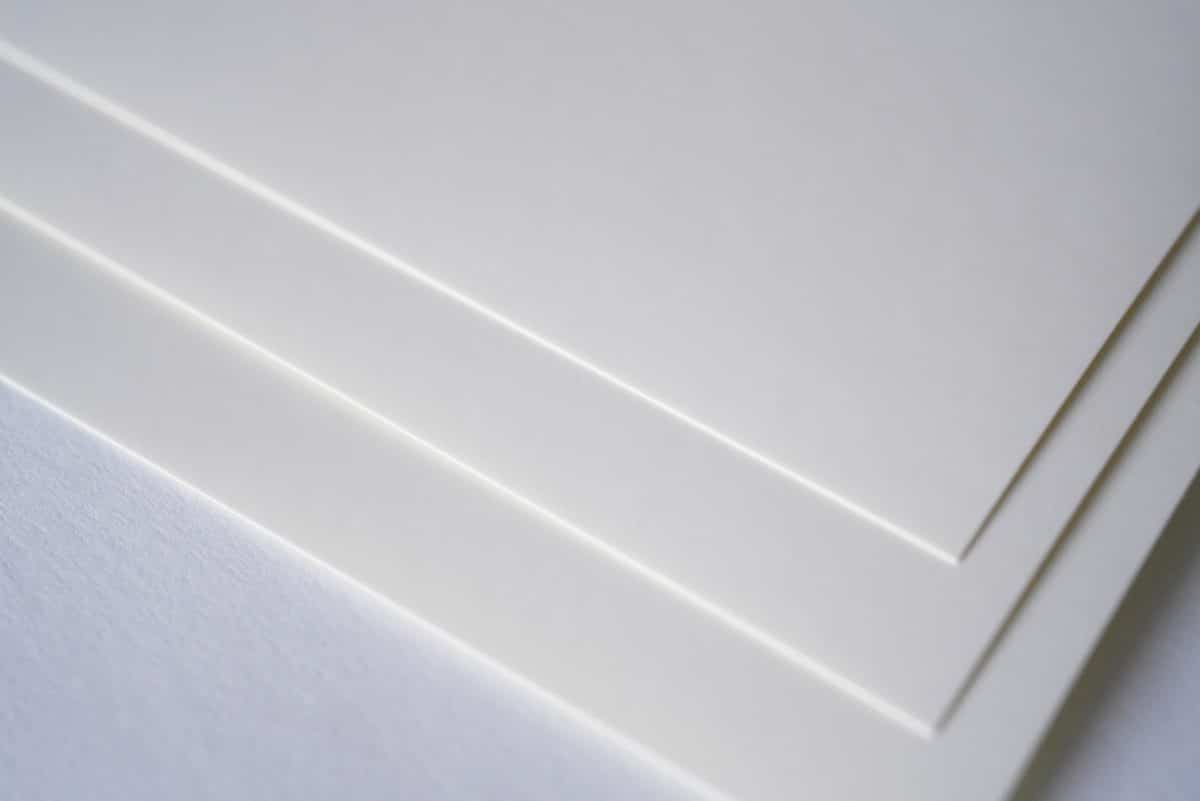
Art paper is a type of coated paper, also known as art coat paper.
The surface is coated with a coating agent, giving it a slight gloss and a smooth texture. This results in high color reproduction, making it suitable for promotional tools such as pamphlets and posters, as well as for printing photo books and art collections.
It is affordably priced and readily available, with fast ink drying, making it ideal for high-volume printing such as flyers. In addition, it is available in various thicknesses, allowing for selection based on specific uses.
However, it is not suitable for writing with pencils or ballpoint pens.
The main difference with matte coat paper is the "gloss."
- Matte coat paper: Offers a subdued, non-glossy appearance for a calm finish
- Art paper: Features a slight gloss that beautifully expresses vivid colors and contrasts
For more information about art paper, please refer to the link below.
What Is Art Paper for Seals? An Explanation of Its Differences from Premium and Mirror Coat Paper
Paper 2: Mirror Coat Paper (Cast Coat Paper)
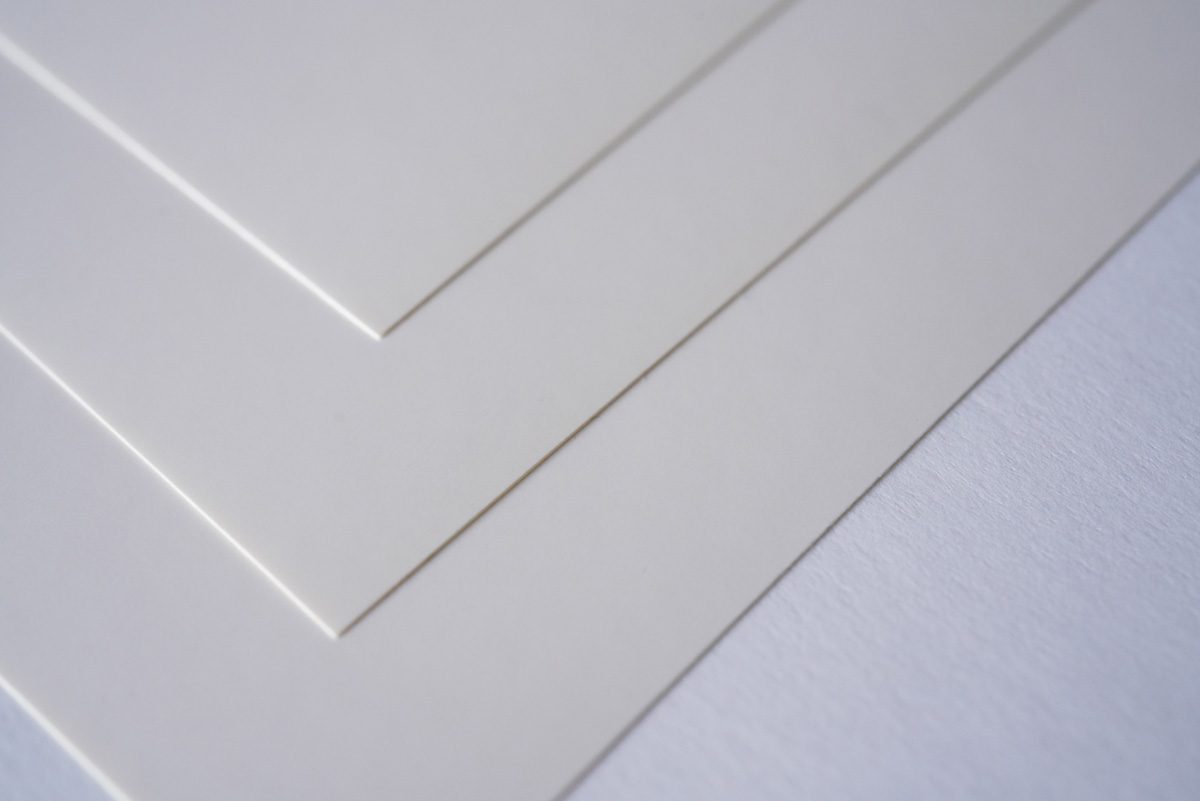
Mirror coat paper is a type of coated paper, also known as cast coat paper. It is characterized by its strong glossy finish.
It has high color reproduction and is suitable for showcasing photos and illustrations with clarity. Therefore, it is ideal for visually striking printed materials such as advertisements, pamphlets, and photo books. It also offers excellent ink adhesion, making it a versatile and economical paper choice.
The difference with matte coat paper is mainly in the texture.
- Matte coat paper: Provides a smooth, non-glossy texture for a subdued finish
- Mirror coat paper: Possesses more gloss than art paper, with a slick texture that produces vibrant colors
For more details about mirror coat paper, please click the link below.
Mirror Coat Paper | A Paper Material Known for Its Strong Glossy Effect
Paper 3: Premium Paper
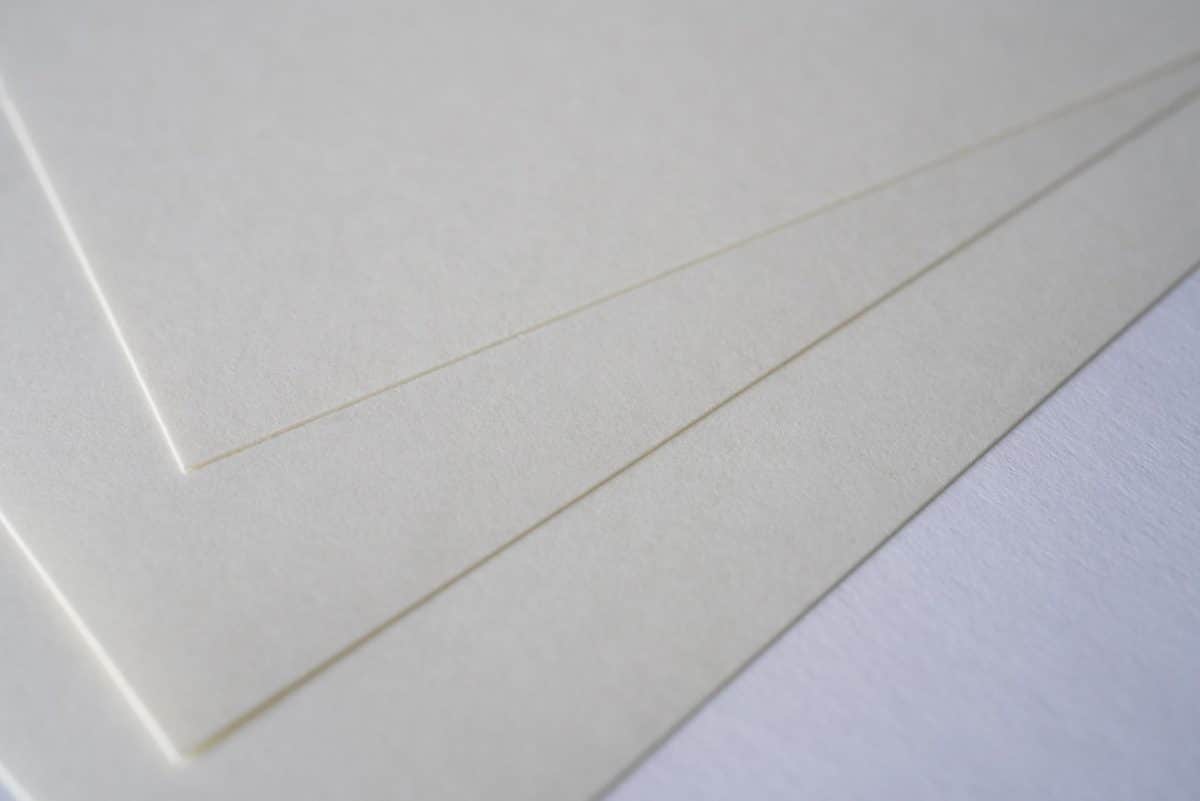
Premium paper is an uncoated, smooth paper that is known for its excellent writing and readability, and is widely used in applications such as copy paper, notebooks, and books.
Although it is low in cost, premium paper is appreciated for its natural texture and luxurious feel. However, it tends to absorb ink easily, which can result in slightly subdued colors.
The difference from matte coat paper is primarily in the hue.
- Matte coat paper: A pure white hue
- Premium paper: A white tone that is slightly ivory
For more information about premium paper, please refer to the article below.
Premium Paper | A Paper Material That Showcases the Natural Matte Texture of Paper
Matte Coat Paper Is Ideal for Seal and Label Printing
Matte coat paper is also well-suited for printing seals and labels, particularly for the following applications:
| Category | Characteristics |
| Product Packaging & Seals | Ideal for product packaging that aims to convey a sense of luxury and sophistication |
| Alcohol Label Seals | Can provide a luxurious feel and added value through the inherent texture of the paper |
| Correction Seals | Because matte coat paper is white, it is perfect for correcting white surfaces |
For seal printing, in addition to paper materials like matte coat paper, there are also film materials that are suitable for durability and water resistance. Understanding the characteristics of each material is essential for selecting the right one for your needs.
If you would like to learn more about seal paper, please refer to the article below.
Top 10 Recommended Seal Papers! An Explanation of How to Choose by Type and Characteristics
Case Studies of Matte Coat Paper
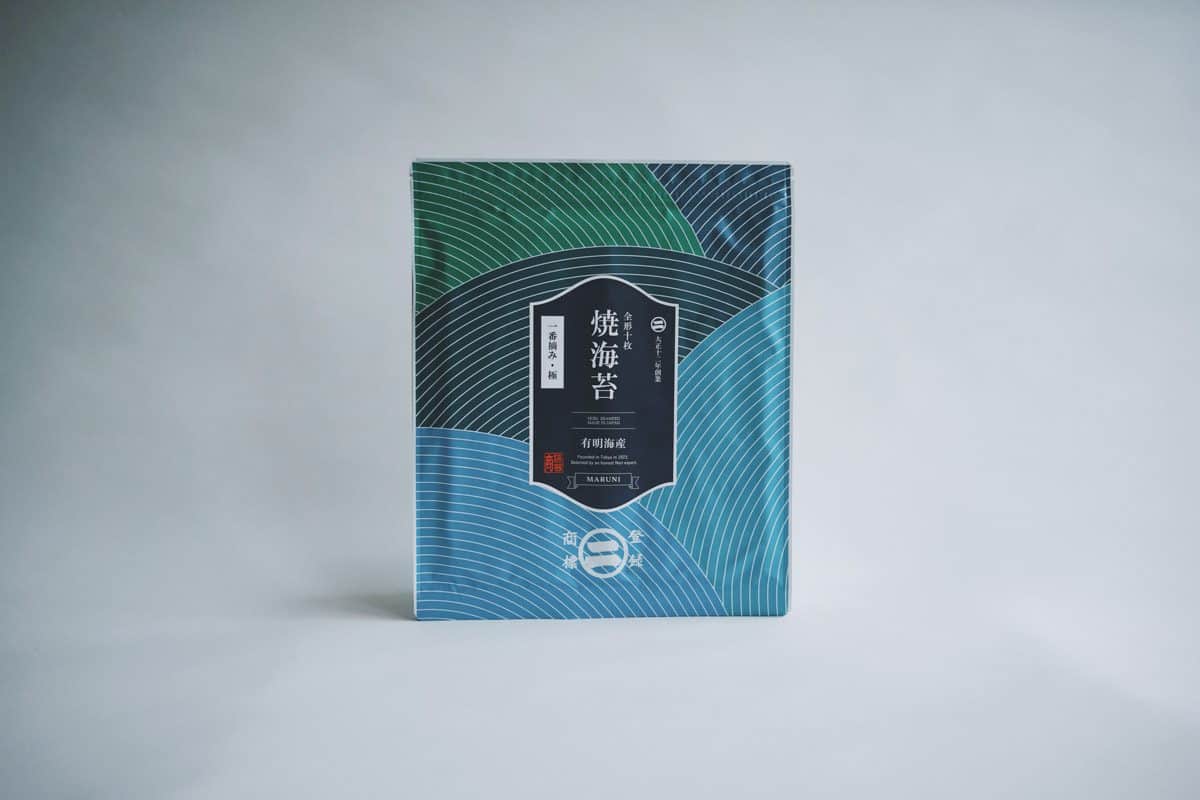
This section introduces case studies of matte coat paper produced by our company.
We created seals for food packaging using matte paper designed for corrections. This seal is a label affixed to the front of a resealable bag used for packaging seaweed.
Normally, regular matte coat paper would allow the printing on the bag to show through, but by using correction matte paper, we can prevent the print from being visible.
In addition, the smooth texture of matte coat paper complements the packaging of the seaweed shop’s products.
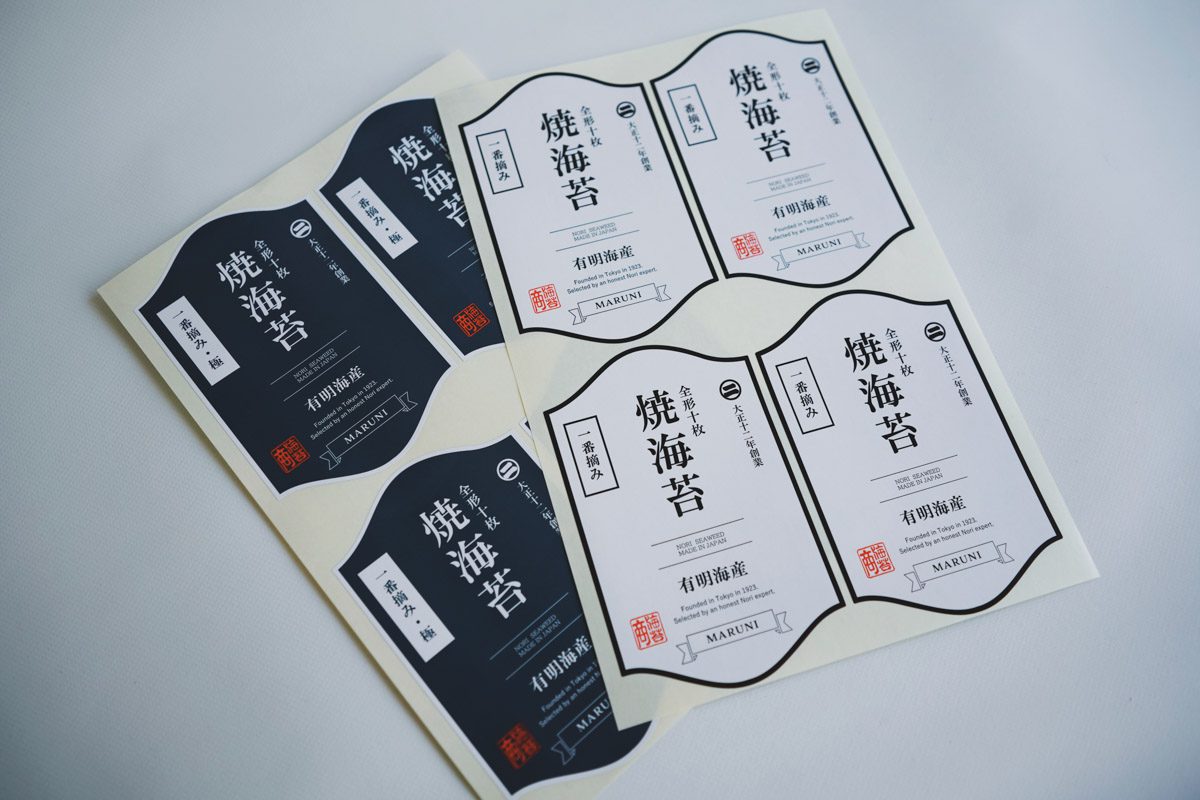
In this production, multiple types of seals were produced to accommodate a wide range of products, which helped reduce overall costs.
If you would like more details about this case study, please refer to the article below.
Case Study|Ito Nori Shop Package Seal
Precautions When Using Matte Coat Paper

Finally, here are some precautions to keep in mind when using matte coat paper. The main precautions are the following two:
- The ink colors may appear slightly darker when printed
- It can be difficult to distinguish from premium paper
Precaution 1: Ink Colors May Appear Slightly Darker When Printed
Matte coat paper tends to render ink colors slightly darker during printing. Therefore, extra care is needed for designs that require very vivid colors.
If you want the colors to appear bright and clear, it is recommended to consider using glossy mirror coat paper or art paper.
If you are concerned about the color tones, you can conduct a trial run and check the results to ensure the final printed product meets your color expectations. Matte coat paper has characteristics that make it more or less suitable depending on the design and colors. If you are unsure or need help selecting the optimal paper, please feel free to contact us.
Precaution 2: It Can Be Difficult to Distinguish from Premium Paper
Matte coat paper and premium paper have similar textures. Since both have little gloss, they can be easily confused during production and after printing, so caution is necessary.
Premium paper typically has a white tone that is slightly close to ivory, whereas matte coat paper is pure white.
However, the subtle gloss of matte coat paper can make it difficult to tell the difference at a glance.
By confirming and comparing the differences in advance, you can ensure that any issues after production are prevented.
Produce with an Understanding of the Characteristics of Matte Coat Paper
Matte coat paper is known for its smooth texture, which can convey a sense of luxury and sophistication through its matte finish. It is relatively low in cost and highly versatile, making it useful for a wide range of applications including pamphlets, flyers, product packaging, and correction seals.
However, it tends to absorb ink and may dry slowly, so extra caution is needed when vivid colors are required or during high-volume, time-sensitive printing jobs.
Our company produces a variety of product labels and seals, including those made with matte coat paper as introduced in this article. If you have any questions or concerns regarding label or seal production, we offer careful support from adhesive selection to final production, so please feel free to contact us.

Start Your Project Now!
Contact Us or Get a Quote!

